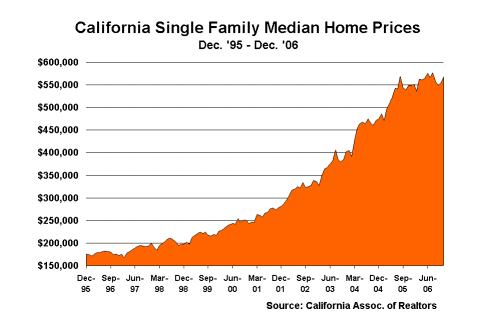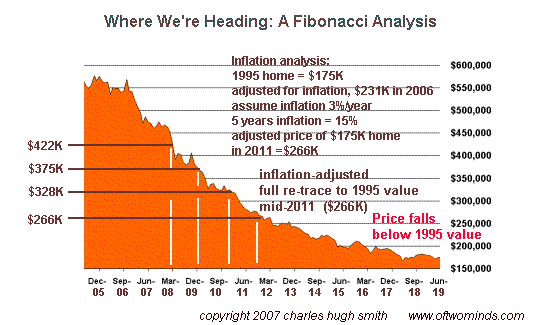Memorial Day: A Passing in the Family
My father died Saturday morning. He had been ill for many years and very ill for many months, so it was not unexpected; those closest to him are relieved that he has been released from the pain which at the end only morphine could relieve.
Since oftwominds.com is not a "this is my life" type blog, I referred to the times I was away from home the past five months as "family matters" or "family business." As a result of the weeks away from my desk, and the other duties being attended to, the blog and email has been a catch-as-catch-can affair. Thank you for your continuing readership despite the haphazard posting and email replies this year.
Since it is Memorial Day, it is fitting to note that my father graduated from Santa Monica High School in June 1944 and immediately joined the Navy with a buddy. He volunteered for PT-boat or submarine service (the pay was slightly better, he explained) but after making through the rigorous testing/training process that eliminated all but a handful of the original class of volunteers, there were no open slots on those services. So my Dad was assigned to electrician school and served in the surface fleet aboard an LST tasked with the invasion of Japan, an undertaking cancelled by the unconditional surrender of Japan.
My father enjoyed the nuts and bolts of unpaid public service, a rare trait. He devoted countless hours to the restoration and maintenance of his church's grounds and buildings, and served on the committees which selected incoming pastors and righted the church's ailing financial situation. He sat through years of citizens oversight committe meetings, insuring the tens of millions of school-bond dollars approved by the voters was being spent wisely and prudently. This required a working knowledge not just of construction but of the physical plant of each school, for there was never enough money for every project desires; trade-offs had to be made, and contracts carefully defined to get the most out of the taxpayer's money.
He also served as president and board member of the local museum/historical society, and various business groups, and enjoyed a long membership in the local Rotary Club and a reading/discussion group. He never watched TV other than a few films a year at home and had no hobbies or amusements as commonly understood. Ironically, perhaps, for someone so engaged in service to institutions he valued, he'd mastered the fine art of procrastination in his personal life, and it took a close brush with death in January to change his mind. After that, he finally took up the tasks he'd talked about but set aside for years: a new garage door, the settling of his will, and the sale of various assets.
He could be quite stubborn--a common enough fault--and there was no forcing him to do anything until he decided to do so. Thus he left my sister, stepmom and I a tangled mess of tax issues which he'd dealt with by filing various unopened letters in a file. He was a packrat with paper (alas, apparently a genetic weakness I inherited) but this was a visible enough fault and one we anticipated dealing with. (Goodbye, 1992 listings of the Standard and Poors 500....)
At the end, he was focused on the tasks yet undone, on relieving his family of the impossible burdens of caring for him at home, and on the Hereafter, a question he faced with curiosity and trepidation, as do all believers, I think, at some level of their being.
Should I be fortunate enough to be conscious when my time comes, I would be quite content to share these same final thoughts.
My brother, sister and I all got to spend a great deal of time with our Dad these past few months, and so we feel there was nothing left unsaid or unasked; my Dad felt blessed to have been given these "bonus months" since January, and we all feel the same. I spent a lot of time listening to my Dad over the past 20 years or so, and though like many of his generation, he was very self-contained, I think I came to know him fairly well. And thus, of course, I came to know something of myself as well, too.
Since it is Memorial Day, I will add this entry from the 8th Air Force log of my father's older brother, who served in the Europen Theatre. he too survived the war, and preceded my father in death after a long and full life. He flew 33 missions over France and Germany in B-24s and B-17s from May 31, 1944 to January 2, 1945. Here are his notes on Mission 4, June 7, 1944, the day after D-Day:
Target: Tours, France Length of mission: 9:45 hours
Bombed and knocked out railroad bridge. Returned at night. German night fighters followed us and shot down four planes when we were over home base. ad to fly away and try to land at English bases. Three English bases turned out lights and fired on us. Finally one English base let us in and before we could land two of our planes crashed on the runway and we had to hunt a fifth field. English were very nice to us at that field.
Those of us reading these terse lines now can only imagine the terror of being hunted by night fighters, of seeing nearby aircraft carrying one's colleagues and friends go down in flames, of trying to find an open air field in the confusion and of the supreme joy of landing in one piece.
Four down, 29 missions to go.
It should noted that the casualty rate for the 8th Air Force over Europe and the Pacific submarine fleet was about 50% for much of the war.
I cannot generalize, but I think my uncle and father served because it was their duty to do so. At the end of their lives, their bodies wizened shadows of the scrawny magnificence they possessed in 1944, they dutifully took all the medications their doctors ordered them to take, and they clung fiercely, even stubbornly, to whatever independence was left to them.
It is also fitting to honor this Memorial Day my wife's uncle Jackson, who volunteered and served in the storied 442nd/100th Combat Regiment, a unit of American-born Japanese-Americans from Hawaii and California which became the most decorated unit in the long history of the U.S. Army as a result of their combat record in Italy and France. Unlike the rest of us bestowed American citizenship by simply being born on American soil, they were forced by circumstance to "earn" the right to their natural-born citizenship with blood.
As our nation's finances implode over the coming decade, we might be inspired by those before us to focus not on self-absorbed, narcissistic demands for the entitlements "we deserve" or "we earned" but on the sacrifices citizenship sometimes requires.
I will be unable to post or respond to emails for the next week or so. Thank you for your kind thoughts and I am sorry I will be unable to reply to emails. There is much to be done, as many of you know from personal experience. Thank you once again for your patience and for your readership.
Of Two Minds is now available via Kindle: Of Two Minds blog-Kindle

























